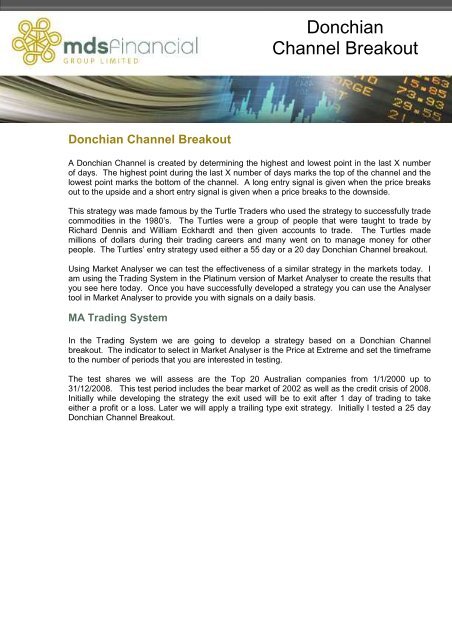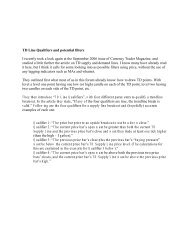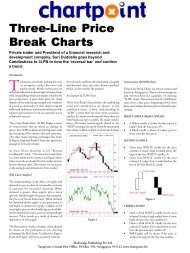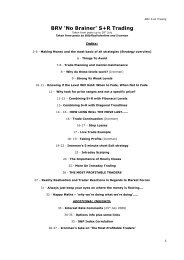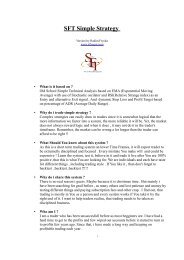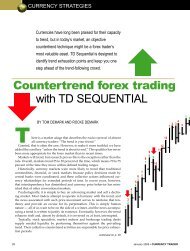Donchian channel breakout (pdf) - Trader Dealer Blog
Donchian channel breakout (pdf) - Trader Dealer Blog
Donchian channel breakout (pdf) - Trader Dealer Blog
You also want an ePaper? Increase the reach of your titles
YUMPU automatically turns print PDFs into web optimized ePapers that Google loves.
<strong>Donchian</strong><br />
Channel Breakout<br />
<strong>Donchian</strong> Channel Breakout<br />
A <strong>Donchian</strong> Channel is created by determining the highest and lowest point in the last X number<br />
of days. The highest point during the last X number of days marks the top of the <strong>channel</strong> and the<br />
lowest point marks the bottom of the <strong>channel</strong>. A long entry signal is given when the price breaks<br />
out to the upside and a short entry signal is given when a price breaks to the downside.<br />
This strategy was made famous by the Turtle <strong>Trader</strong>s who used the strategy to successfully trade<br />
commodities in the 1980’s. The Turtles were a group of people that were taught to trade by<br />
Richard Dennis and William Eckhardt and then given accounts to trade. The Turtles made<br />
millions of dollars during their trading careers and many went on to manage money for other<br />
people. The Turtles’ entry strategy used either a 55 day or a 20 day <strong>Donchian</strong> Channel <strong>breakout</strong>.<br />
Using Market Analyser we can test the effectiveness of a similar strategy in the markets today. I<br />
am using the Trading System in the Platinum version of Market Analyser to create the results that<br />
you see here today. Once you have successfully developed a strategy you can use the Analyser<br />
tool in Market Analyser to provide you with signals on a daily basis.<br />
MA Trading System<br />
In the Trading System we are going to develop a strategy based on a <strong>Donchian</strong> Channel<br />
<strong>breakout</strong>. The indicator to select in Market Analyser is the Price at Extreme and set the timeframe<br />
to the number of periods that you are interested in testing.<br />
The test shares we will assess are the Top 20 Australian companies from 1/1/2000 up to<br />
31/12/2008. This test period includes the bear market of 2002 as well as the credit crisis of 2008.<br />
Initially while developing the strategy the exit used will be to exit after 1 day of trading to take<br />
either a profit or a loss. Later we will apply a trailing type exit strategy. Initially I tested a 25 day<br />
<strong>Donchian</strong> Channel Breakout.
<strong>Donchian</strong><br />
Channel Breakout<br />
As can be seen from the results the strategy is profitable, but nothing spectacular. It makes a<br />
profit of $8,000, based on $100,000 capital and a trade size of $5,000 over eight years. It is not<br />
time to give up your day job just yet.<br />
The Turtle Strategy which used a 55 day <strong>breakout</strong> is even worse losing $1,500, so not really a<br />
great strategy for today’s market. A 10 day <strong>breakout</strong> makes $5,000, with the profit reaching as<br />
high as $40,000 before losing in 2008. A 5 day <strong>breakout</strong> makes $15,000 with a peak profit of<br />
$35,000.
<strong>Donchian</strong><br />
Channel Breakout<br />
The strategy makes money during a bullish market, but loses money when the market turns<br />
bearish as it did in 2002 and 2008. But let’s find the market’s secrets that may be hidden from<br />
view.<br />
What a Difference a Day Makes<br />
Maybe there are better days of the week to trade this strategy, so let’s take a look at how this<br />
plays out. The results in the table below show what happens when you trade just one set day of<br />
the week following this strategy.<br />
Day of Week Profit<br />
Monday -$2,253<br />
Tuesday -$4,034<br />
Wednesday $5,492<br />
Thursday $3,563<br />
Friday $13,551<br />
Wow what a difference a day makes! It would be best to stay in bed on Monday and Tuesday.<br />
So make sure you take the first two days of the week off when using this strategy and if you want<br />
to work only one day a week make sure it is a Friday. Now adding the criteria to trade on<br />
Wednesday, Thursday or Friday to the strategy produces the following results.
<strong>Donchian</strong><br />
Channel Breakout<br />
The strategy profit improves reaching over $30,000, but there were losses experienced during<br />
2008 so it drops back to a return of $22,000. So it is time to add a different exit strategy, other<br />
than getting out one day after we get in, to see whether we can improve the results further.
<strong>Donchian</strong><br />
Channel Breakout<br />
Exit Strategy<br />
Using a 4% trailing stop that is moved up each day following the share price as it rises actually<br />
produces worse results than exiting after 1 day in the position. While the peak profit is higher at<br />
$50,000 this strategy loses more money in a bear market environment.<br />
By reviewing the summarised report we can now see the details of the overall strategy shown in<br />
the table below.
<strong>Donchian</strong><br />
Channel Breakout<br />
The strategy is profitable 48% of the time and delivers an average win of $64 and an average loss<br />
of -$61. The hit rate is acceptable, but the risk reward at 1.04 has to be better for the strategy to<br />
be profitable overall. In summary this does not seem like a very good trading strategy. Testing<br />
different time frames and exits produces similar results, so trading <strong>Donchian</strong> Channel Breakouts<br />
is unlikely to be a wonderful strategy.<br />
Turtle Soup<br />
It would be nice to find a long only strategy that makes money even during a bear market, rather<br />
than just in a bullish market environment. For some of you this may seem like wishful thinking,<br />
but there is a way. So let’s try turning this trading idea upside down. Instead of trading an upside<br />
<strong>Donchian</strong> Channel Breakout, we are going to trade a downside <strong>breakout</strong> by buying the share<br />
when it breaks down. In other words we are going to fade the <strong>breakout</strong>. This strategy has been<br />
referred to as Turtle Soup.
<strong>Donchian</strong><br />
Channel Breakout<br />
Using a 15 day <strong>Donchian</strong> Channel Breakout to the downside with a one day exit and the other<br />
parameters the same as we looked at before we find the following:<br />
The strategy makes money even during 2008, which was a particular volatile time, and we are<br />
only trading on the long side here. Overall this strategy is up $45,000 over 8 years, based on a<br />
$100,000 capital base and $5,000 trades.<br />
Trading Days To Avoid<br />
As before there are better days of the week to trade this strategy, so let’s take a look at how this<br />
plays out. The results in the table below show what happens when you trade just one set day of<br />
the week following this strategy.<br />
Day of Week Profit<br />
Monday $15,650<br />
Tuesday $16,363<br />
Wednesday -$2,272<br />
Thursday $3,001<br />
Friday $11,977
<strong>Donchian</strong><br />
Channel Breakout<br />
Wednesday loses money and is a day that it would be best to avoid. Thursday is not as profitable<br />
as the rest of the week, but it does still make money. So by excluding Wednesday we come up<br />
with the following results.<br />
The strategy profit improves reaching over $45,000, and it made very good profits during 2008,<br />
even though the markets were down heavily. So it is time to add a different exit strategy, other<br />
than getting out one day after we get in, to see whether we can improve the results further.
<strong>Donchian</strong><br />
Channel Breakout<br />
Exit Strategy<br />
Using a 4% trailing stop that is moved up each day following the share price as it rises actually<br />
produces far better results than exiting after just 1 day in the position.<br />
Profit is boosted to $238,030 and drawdown through 2002 has been almost completely<br />
eliminated. The strategy was profitable through 2008 and considering it is a long only strategy the<br />
results are now respectable. By reviewing the summarised report we can now see the details of<br />
the overall strategy shown in the table below.
<strong>Donchian</strong><br />
Channel Breakout<br />
The strategy is profitable 47% of the time and delivers an average win of $348 and an average<br />
loss of -$181. The hit rate could be better, but the risk reward of this trading strategy at 1.92<br />
provides a profitable trading strategy overall. Despite the strategy being “right” less than 50% of<br />
the time the strategy is profitable because of a good risk reward.
<strong>Donchian</strong><br />
Channel Breakout<br />
Brokerage<br />
I have not yet been able to find a broker that will execute my trades for free so we have to add in<br />
the cost of brokerage to make the trades. Based on a fee of 0.15% of the trade value the<br />
following results are achieved.<br />
The strategy now makes $207,809 on a $100,000 investment over eight years. These are<br />
excellent results when compared to the market return of just 16% during this time. There are<br />
many variations on this trading strategy with any number of days that could be used for the<br />
<strong>Donchian</strong> Channel Breakout. Other exits could also be used and all of this may improve the<br />
trading results. You can test all these ideas with an upgrade to the Platinum Market Analyser.<br />
Conclusion<br />
The <strong>Donchian</strong> Channel <strong>breakout</strong> can be used as the basis of a successful trading strategy. Never<br />
underestimate the importance of the day of the week when searching for good trading results.<br />
The traditional approach of the Turtles can be turned on its head for great results when trading the<br />
ASX Top 20 companies by entering a downside <strong>breakout</strong> for a long trade. You can find the<br />
companies that meet the entry criteria by using the Analyser Tool in Market Analyser.


